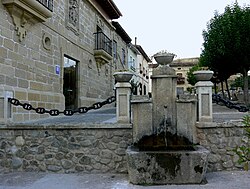Villalobar de Rioja is a municipality of the Autonomous region of La Rioja, (Spain), with no more than 100 inhabitants.[2] It is located in a privileged location between Santo Domingo de la Calzada and Haro.
Villalobar de Rioja | |
|---|---|
 Plaza de España. Fountain and Hotel El Palacete. | |
Location within La Rioja. | |
| Coordinates: 42°29′31″N 2°57′43″W / 42.49194°N 2.96194°W | |
| Country | |
| Autonomous community | |
| Comarca | Santo Domingo de la Calzada |
| Government | |
| • Mayor | Álvaro Tecedor Rotaeche (PP) |
| Area | |
• Total | 10.94 km2 (4.22 sq mi) |
| Elevation | 585 m (1,919 ft) |
| Population (2018)[1] | |
• Total | 67 |
| Demonym | villalobarense |
| Postal code | 26256 |
| Website | www |
You can help expand this article with text translated from the corresponding article in Spanish. (August 2011) Click [show] for important translation instructions.
|
Etymology
editThis section is empty. You can help by adding to it. (March 2021) |
Geography
editIt is located in the Oja valley. Agricultural activities are predominant, mostly dryland farming, with the growing of wheat, barley, potato, beet and vegetables.
History
editRemains of the old Roman road between Tricio and Briviesca can be found within the city limits. Ancient Romans called the village Alfovare. It appears as Villafavar in a document of the year 1120. Until 23 December 1804 it was a village belonging to Santo Domingo de la Calzada, when Charles IV of Spain granted it the title of independent village.
Historic buildings and monuments
edit- Parish Church of La Asunción, located on the top of the village. Dates from the end of the 12th and beginning 13th century. The portal is covered with a porch which protects it from erosion. It has four rounded archivolts with small columns and moldings supported by pilasters and L-shaped columns.
- 12th century fortified tower, built with ashlar stones. It has a squared floor and consists of a basement or wine cellar, ground floor and further floor on the top of wooden beams. The interior of the tower has been modified.
- Bustamante mansion. Noble mansion from the beginning of the 17th century, with ashlar stones and the coat of arms of the Bustamante family, considered artistic and musical heritage and referent which was recently converted into a luxury hotel, with hand-painted decorations and rooms of different cultural themes.
- Emblazoned ancestral houses.
Festivals and traditions
edit- April 16: Saint Turibius of Liébana
- August 25: Thanksgiving Festival. Procession with Saint Peregrín
Cultural associations
edit- Socio Cultural Association “Villa Alfovare”
Tourism
edit- Walks through the river Oja poplar grove to Santo Domingo de la Calzada.
See also
editReferences
edit- ^ Municipal Register of Spain 2018. National Statistics Institute.
- ^ "La Rioja: Población por municipios y sexo:Cifras oficiales de población resultantes de la revisión del Padrón municipal a 1 de enero de 2011". Instituto Nacional de Estadística. Retrieved 28 May 2012.
External links
edit

